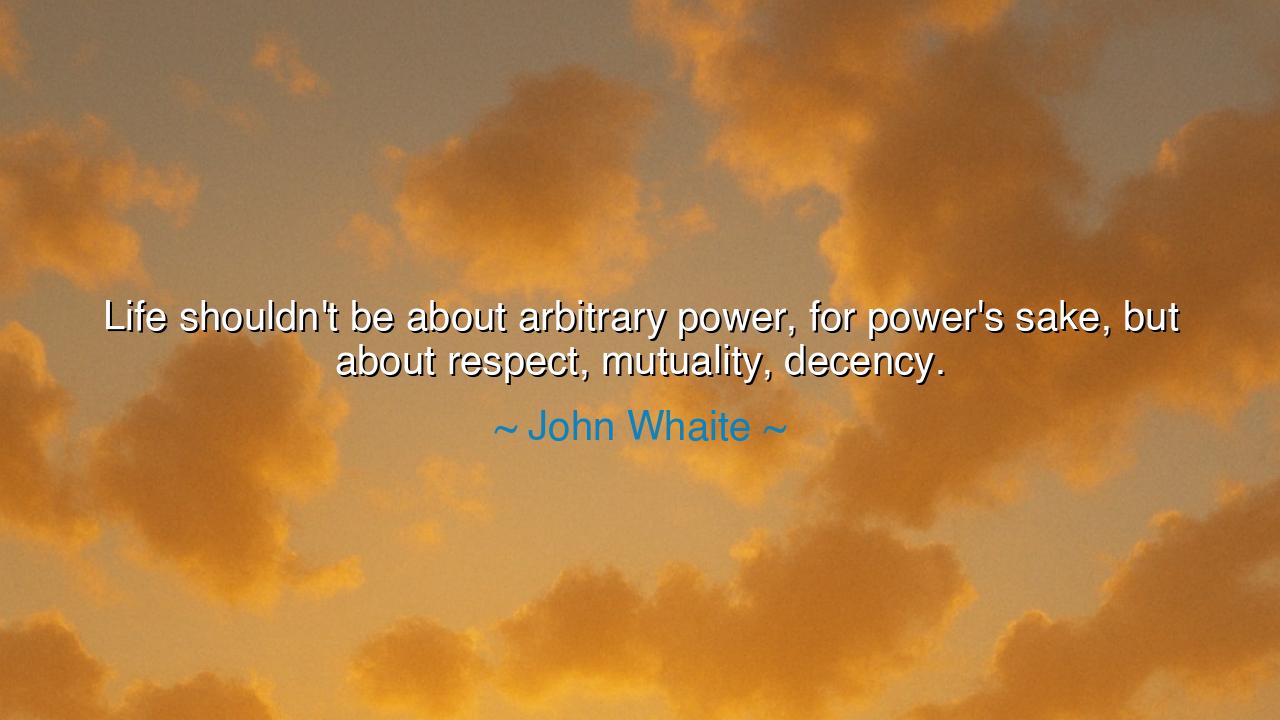
Life shouldn't be about arbitrary power, for power's sake, but
Life shouldn't be about arbitrary power, for power's sake, but about respect, mutuality, decency.






When John Whaite said, “Life shouldn’t be about arbitrary power, for power’s sake, but about respect, mutuality, decency,” he spoke as one who has looked into the heart of ambition and seen both its brilliance and its ruin. His words are a gentle rebuke to the age-old temptation of humankind — the lust for power untempered by virtue. From the palaces of emperors to the corridors of modern life, men and women have often mistaken domination for greatness, control for success. Whaite’s reflection calls us back to a more sacred truth: that life, in its highest form, is not a struggle for dominance, but a practice of respect, mutuality, and decency — the triad upon which all enduring civilizations, friendships, and loves must rest.
To live for power’s sake is to pursue an illusion. Power without purpose is like fire without warmth — it burns but does not illuminate. The ancients warned of this folly. In the myths of Greece, King Midas, who wished that all he touched would turn to gold, soon found his wish a curse, for he could no longer embrace or eat or live. His hunger for power consumed his joy, leaving him surrounded by lifeless splendor. Whaite’s words remind us of Midas’s lesson: that to seek authority for its own sake is to lose the very humanity that makes authority meaningful. Respect and mutuality, on the other hand, turn power from a weapon into a tool — from domination into stewardship.
The origin of Whaite’s insight lies in his own experience as a man shaped by both creativity and struggle. Known first as a baker and artist, and later as a voice of authenticity and vulnerability, he learned through his own journey that real influence does not come from control, but from connection. His path — from winning fame to finding peace — reflects the truth that one must rule one’s heart before ruling anything else. In a world obsessed with status and image, he offers an ancient kind of wisdom: that decency, the simple practice of kindness and honor, is rarer and more powerful than any crown. For power may command fear, but decency commands love, and love is the truest form of strength.
History, too, offers us examples that illustrate his truth. Consider the story of Marcus Aurelius, the philosopher-emperor of Rome. Though he wielded the might of the Roman legions, he sought not glory, but virtue. In his writings — The Meditations — he reminded himself that “to rule others, one must first rule the self.” He saw power as a responsibility, not a privilege. He lived with mutuality, treating even his servants with dignity and his enemies with restraint. Rome, under his hand, knew an age of stability because its ruler valued decency over domination. Marcus Aurelius’s legacy endures not because he conquered, but because he governed with wisdom and humility — proof that true greatness springs from respect, not arbitrary power.
Yet the lesson is not only for emperors and leaders; it is for all who walk the earth. For power exists in every heart — the power to hurt or to heal, to listen or to silence, to take or to give. Each of us holds a small throne within our lives, and how we rule it determines the world we build around us. The family that values mutuality over control, the workplace that honors respect over fear, the friendship that prizes decency over pride — these are the true empires of the soul. Whaite’s words invite us to look inward and ask: Do we seek to be obeyed, or to be understood? To be admired, or to be kind? The answer to these questions reveals the nature of our power.
In truth, respect is the only power that multiplies when shared. The ancients knew this as well. In the Confucian tradition, the harmony of the kingdom was built upon the respect between ruler and subject, parent and child, friend and friend. The mutual exchange of honor created peace, for where respect flows, fear recedes. Likewise, decency — the moral courage to act rightly even when unobserved — is the foundation of lasting influence. The tyrant’s reign dies with his breath, but the decent soul’s legacy endures for generations, carried on in the quiet acts of those he inspired. Whaite’s message, though modern in language, carries the voice of ancient wisdom: that the measure of one’s life is not how high one stands, but how gently one treats those below.
Thus, the lesson of John Whaite’s words is both simple and profound: seek not power, but purpose; seek not dominion, but dignity. Let your strength be tempered by compassion, your ambition guided by decency. In every relationship — between nations or neighbors, lovers or rivals — choose mutuality over mastery. For power, when used without respect, consumes both the wielder and the world. But when grounded in honor and shared with humility, it becomes light — a beacon by which others find their way.
And so, let his words be remembered as a guiding star for all generations: “Life shouldn’t be about arbitrary power, for power’s sake, but about respect, mutuality, decency.” These are not the virtues of weakness, but of wisdom. Build your life upon them, and you will stand unshaken by the storms of pride and greed. For though empires may crumble and riches fade, the heart that honors others — that governs with fairness, listens with empathy, and acts with integrity — leaves a legacy that time itself cannot erase.






AAdministratorAdministrator
Welcome, honored guests. Please leave a comment, we will respond soon